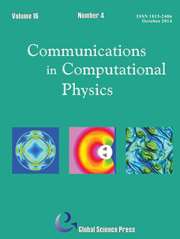Crossref Citations
This article has been cited by the following publications. This list is generated based on data provided by
Crossref.
Torrilhon, Manuel
and
Sarna, Neeraj
2017.
Hierarchical Boltzmann simulations and model error estimation.
Journal of Computational Physics,
Vol. 342,
Issue. ,
p.
66.
Sarna, Neeraj
and
Torrilhon, Manuel
2018.
Entropy stable Hermite approximation of the linearised Boltzmann equation for inflow and outflow boundaries.
Journal of Computational Physics,
Vol. 369,
Issue. ,
p.
16.
Koellermeier, Julian
and
Torrilhon, Manuel
2018.
Two-Dimensional Simulation of Rarefied Gas Flows Using Quadrature-Based Moment Equations.
Multiscale Modeling & Simulation,
Vol. 16,
Issue. 2,
p.
1059.
Koellermeier, Julian
and
Torrilhon, Manuel
2018.
Theory, Numerics and Applications of Hyperbolic Problems II.
Vol. 237,
Issue. ,
p.
221.
Koellermeier, Julian
2019.
Error estimators for adaptive simulation of rarefied gases using hyperbolic moment models.
Vol. 2132,
Issue. ,
p.
120004.
Gupta, Vinay Kumar
2020.
Moment theories for a -dimensional dilute granular gas of Maxwell molecules.
Journal of Fluid Mechanics,
Vol. 888,
Issue. ,
Koellermeier, Julian
and
Scholz, Ullika
2020.
Spline moment models for the one-dimensional Boltzmann–Bhatnagar–Gross–Krook equation.
Physics of Fluids,
Vol. 32,
Issue. 10,
Fan, Yuwei
and
Koellermeier, Julian
2020.
Accelerating the Convergence of the Moment Method for the Boltzmann Equation Using Filters.
Journal of Scientific Computing,
Vol. 84,
Issue. 1,
Koellermeier, Julian
and
Samaey, Giovanni
2020.
Computational Science – ICCS 2020.
Vol. 12142,
Issue. ,
p.
321.
Pimentel-García, Ernesto
Parés, Carlos
Castro, Manuel J.
and
Koellermeier, Julian
2021.
On the efficient implementation of PVM methods and simple Riemann solvers. Application to the Roe method for large hyperbolic systems.
Applied Mathematics and Computation,
Vol. 388,
Issue. ,
p.
125544.
Theisen, Lambert
and
Torrilhon, Manuel
2021.
fenicsR13: A Tensorial Mixed Finite Element Solver for the Linear R13 Equations Using the FEniCS Computing Platform.
ACM Transactions on Mathematical Software,
Vol. 47,
Issue. 2,
p.
1.
Giroux, Fabien
and
McDonald, James G.
2021.
An Approximation for the Twenty-One-Moment Maximum-Entropy Model of Rarefied Gas Dynamics.
International Journal of Computational Fluid Dynamics,
Vol. 35,
Issue. 8,
p.
632.
Koellermeier, Julian
and
Samaey, Giovanni
2021.
Projective integration schemes for hyperbolic moment equations.
Kinetic & Related Models,
Vol. 14,
Issue. 2,
p.
353.
Li, Ruo
Lu, Yixiao
Wang, Yanli
and
Xu, Haoxuan
2022.
Hermite Spectral Method for Multi-Species Boltzmann Equation.
SSRN Electronic Journal ,
Kim, Dohyun
and
Kim, Jeongho
2022.
Aggregation and disaggregation of active particles on the unit sphere with time-dependent frequencies.
Discrete & Continuous Dynamical Systems - B,
Vol. 27,
Issue. 4,
p.
2247.
Li, Ruo
Lu, Yixiao
Wang, Yanli
and
Xu, Haoxuan
2022.
Hermite spectral method for multi-species Boltzmann equation.
Journal of Computational Physics,
Vol. 471,
Issue. ,
p.
111650.
Huang, Juntao
Cheng, Yingda
Christlieb, Andrew J.
and
Roberts, Luke F.
2022.
Machine learning moment closure models for the radiative transfer equation I: Directly learning a gradient based closure.
Journal of Computational Physics,
Vol. 453,
Issue. ,
p.
110941.
Abdelmalik, M.R.A.
van der Woude, D.A.M.
and
van Brummelen, E.H.
2022.
Entropy bounds for the space–time discontinuous Galerkin finite element moment method applied to the BGK–Boltzmann equation.
Computer Methods in Applied Mechanics and Engineering,
Vol. 398,
Issue. ,
p.
115162.
Koellermeier, Julian
and
Samaey, Giovanni
2022.
Spatially Adaptive Projective Integration Schemes For Stiff Hyperbolic Balance Laws With Spectral Gaps.
The SMAI Journal of computational mathematics,
Vol. 8,
Issue. ,
p.
295.
De Fraja, Thomas C.
Rana, Anirudh S.
Enright, Ryan
Cooper, Laura J.
Lockerby, Duncan A.
and
Sprittles, James E.
2022.
Efficient moment method for modeling nanoporous evaporation.
Physical Review Fluids,
Vol. 7,
Issue. 2,

